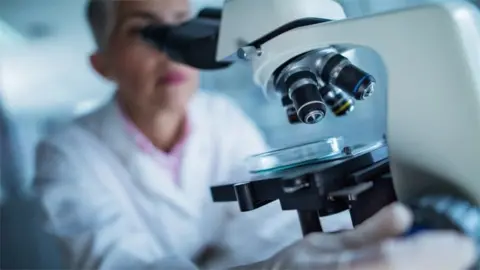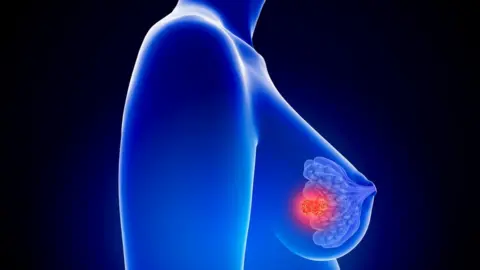Cancer: One in five cancer diagnoses 'in Emergency Departments'
 Getty Images
Getty ImagesOne in five people in Northern Ireland receive their cancer diagnosis while attending an emergency department (ED), according to research by the NI Cancer Registry.
The registry confirmed to BBC News NI that, at present, a quarter of bowel cancers are being diagnosed in EDs.
It said mostly older patients are affected.
Its research also found that a third of lung cancers in NI are diagnosed after a patient turns up at an ED.
According to senior health professionals and some cancer charities patients having to wait lengthy times to see a consultant is contributing to the problem.
Earlier this week, BBC News NI revealed that a number of non-emergency operations across Northern Ireland have had to be suspended, as a result of staff shortages.
It has also emerged that the number of patients who waited more than 12 hours in Northern Ireland's emergency departments in September was double the same time last year.
Survival rate 'lowest'
The head of services at Macmillan Cancer Support, Heather Monteverde, said the statistics about diagnoses were "shocking and extremely worrying".
She said emergency departments cannot provide the very specialist care needed by cancer patients.
Ms Monteverde added that only 55% of cancer patients in Northern Ireland are starting treatment within the 62-day target, a figure that was "deteriorating month-by-month".
"Behind the statistics are individual people who are worried that they are very ill," she told the BBC's Good Morning Ulster programme.
"They have attended their GP and sometimes they are on very long waiting lists; their condition is deteriorating and they feel they have no other option but to pitch up in an emergency department.
"Or indeed, sometimes their GPs are so frustrated that they can't get them seen, their GPs are advising them to attend an emergency department."
The cancer survival rate is lowest for patients who present via emergency than any other route, although it is thought this is because those patients tend to have later-stage cancers than those who present via other medical routes.
 Getty Images
Getty ImagesMs Monteverde said EDs are not the ideal environment to learn that you have the disease.
"For most people, a cancer diagnosis is a fairly devastating event in their lives," she said.
"To be in a really busy A&E department which is quite often mayhem - it's noisy, it's crowded; there's no privacy."
Earlier this year, a report by the Northern Ireland Cancer Registry found that 74% of the 4,316 people who died from cancer in Northern Ireland in 2015 were admitted to Emergency Departments in the final years of their lives.
Also, one in six (17%) people died within seven days of their last emergency admission and almost all (95%) of these died in hospital.
Anna Gavin from the Northern Ireland Cancer Registry agreed with Ms Monteverde that longer waiting lists had added to the number of cancer patients being diagnosed in EDs.
"Unfortunately, the people who present through A&E present are at the later stage of disease and their survival [rate] is much lower than if they present through some of the other ways that you can come into the system."
Ms Gavin said when there are screening programmes in place, such as breast and bowel cancer screening, it led to a "wide variation" in the number of ED diagnoses, compared to conditions where no regular screening is carried out.
Breast assessment targets
However, the 14-day breast assessment target has not been met again in Northern Ireland.
During March, 1,387 patients were seen by a breast cancer specialist for a first assessment following an urgent referral for suspected breast cancer.
Of these, 85.6 % (1,187) were seen within 14 days compared with 100% in the previous year.
Statistics published by the Department of Health show 69.4% of new referrals for suspected breast cancer were classified as urgent in March 2019.
The department said the waiting times are "unacceptable".
Previously the permanent health secretary said that it would take £1bn to tackle Northern Ireland's hospital waiting lists.
